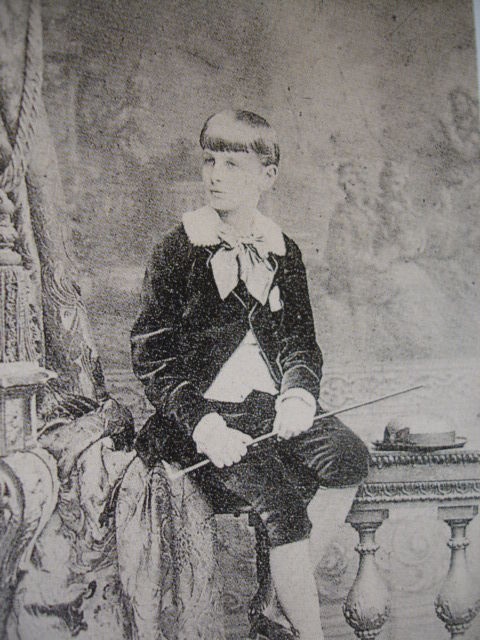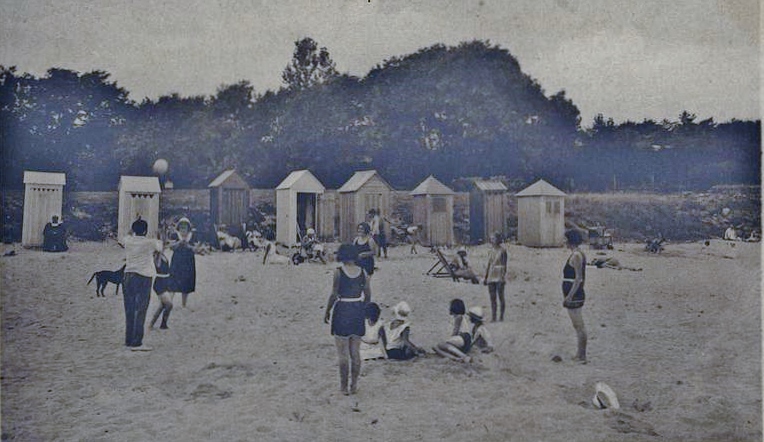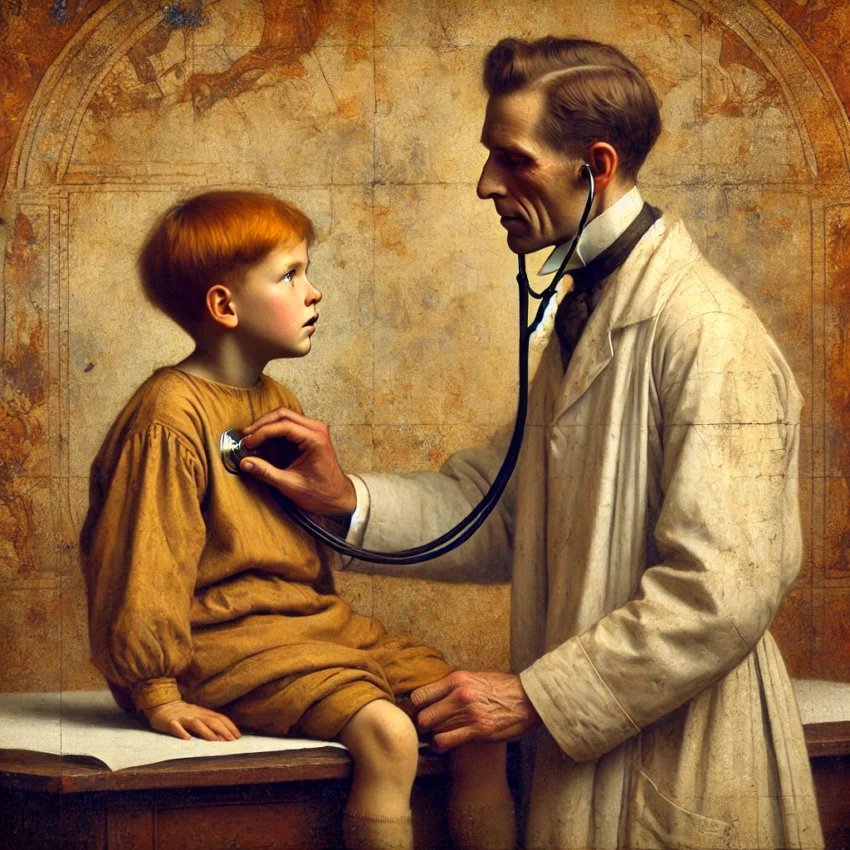“On avait fait venir le docteur Cottard qui, après m’avoir ausculté, m’avait déclaré sujet à des crises nerveuses et m’avait prescrit un peu de lait chaud avant de me coucher.”
“They had called Dr. Cottard, who, after examining me, declared me subject to nervous attacks and prescribed a little warm milk before bed.”
In Proust’s monumental work, “À la recherche du temps perdu,” health issues feature prominently. This is partly because the protagonist—often seen as Proust himself—suffers from various chronic maladies, including respiratory problems, insomnia, and nervous hyperexcitability. Proust often explores these conditions through an emotional and psychological lens, reflecting their likely psychosomatic nature.

The protagonist contends with anxiety and insomnia, often tied to emotional states. In childhood, for instance, these conditions manifest in his anxious anticipation of his mother’s goodnight kiss:
“Souvent je m’endormais avant que ma mère eût pu monter. Mais d’autres soirs, j’attendais, dans la crainte du moment où elle allait partir, mon esprit tendu à l’effort d’entendre, d’éteindre ma conscience avant que fût survenu le moment redouté.”
“Often, I would fall asleep before my mother could come up. But on other nights, I waited, dreading the moment she would leave, my mind strained to the effort of hearing, of extinguishing my awareness before the dreaded moment occurred.”
Asthma also torments the protagonist, often associated with situations of psychological and emotional tension. For this condition, doctors fail to find effective remedies. Even trips and thermal cures, frequently proposed as treatments at the time, prove ineffective.
The narrative frequently alludes to a “nervous hypersensitivity” that triggers episodes of anxiety, agitation, and nervous attacks. These symptoms are often tied to social interactions or environmental factors; the author exhibits an acute sensitivity to changes in his surroundings. Ironically, trips and stays at holiday resorts and spa towns—intended to alleviate his condition—often become sources of distress themselves.

Health issues permeate the work, with medical science portrayed as largely ineffective in both diagnosis and treatment. This inefficacy originates not only from the era’s limited medical knowledge but also from Proust’s unique perspective on the human condition. In his view, physical ailments, psychological distress, and emotional suffering are intricately interwoven—a complex tapestry that defies simple medical solutions.
Dr. Cottard is a recurring character in several volumes of “À la recherche du temps perdu.” He first appears in “Du côté de chez Swann” and plays a significant role throughout the novel as a constant attendee of the Verdurin soirée, a gathering of artists and intellectuals hosted by a bourgeois family. As a representative figure of the era’s medical and social milieu, he often becomes the target of Proust’s sharp wit and biting satire.
Proust likely drew inspiration for the character of Cottard from multiple sources. One probable model was Dr. Gustave Roussy, whom the writer met in 1910 and described as an “example of medical vulgarity.” Others suggest Dr. Samuel Pozzi as a possible inspiration. However, it’s more likely that Cottard is a composite character, blending traits from various medical figures Proust encountered throughout his life.
Cottard’s character appears throughout various volumes of the work:
Volume 1 “Du côté de chez Swann”: at Madame Verdurin’s salon, Cottard presents himself as insecure and conformist. During discussions on artistic and intellectual topics, he often expresses appreciation for others’ statements with a coarse laugh—a behavior that underscores his need for approval and reveals his social anxiety.
Volume 2 “À l’ombre des jeunes filles en fleurs,”: Cottard reappears at the Verdurin gatherings, this time at the seaside resort of Balbec. Despite his professional success, he remains characterized as superficial and conformist—a man who has climbed the social ladder without shedding his bourgeois limitations.
Volume 3 “Le Côté de Guermantes”: Cottard has risen to prominence as a renowned physician and authority in his field. Despite his professional success, he continues to frequent the Verdurins’ gatherings, where his superficiality remains a constant, highlighted characteristic.
Volume 4 “Sodome et Gomorrhe”: Proust’s satire of Cottard, still a renowned luminary, intensifies in this volume. Despite his professional status, it highlights how often situations elude the doctor’s understanding.
In volumes 5 and 6, Dr. Cottard occasionally appears within the context of the Verdurin gatherings. However, his role in these volumes is limited and secondary.
Volume 7 “Les Temps retrouvé”: Cottard’s career is well-established but has aged and diminished in stature. Despite his brilliant professional achievements, he ultimately leaves an impression of emptiness and superficiality in matters of life and memory.
An analysis of the passages concerning Dr. Cottard reveals a rather uninspiring figure, despite his prestigious academic position.
From a human standpoint, Cottard’s insecurity and craving for others’ approval are evident. To gain acceptance, he readily conforms to trends, revealing himself as hypocritical, superficial, and overly concerned with status.
“Le docteur Cottard, un des piliers du petit groupe, mais qui, impressionné, intimidé par les grands mots de « maître », de « chef-d’œuvre », que Mme Verdurin lâchait dans la conversation pour s’amuser, était, quant à lui, enclin à être ironique vis-à-vis de cette œuvre nouvelle, mais comme on s’était extasié devant elle, il avait à son tour admiré le morceau de piano qui venait d’être joué.”
“Doctor Cottard, one of the pillars of the small group, but who, impressed, intimidated by the grand words like ‘master’ and ‘masterpiece’ that Madame Verdurin dropped into conversation for amusement, was himself inclined to be ironic towards this new work. However, as everyone had raved about it, he had in turn admired the piano piece that had just been played.”
Cottard’s raucous laughter, a ploy to curry favor with his hosts, ironically exposes his deep-seated need for acceptance.
“Le docteur Cottard, qui avait un rire sonore, bruyant, envahissant, et qui riait pour tout et pour rien, riait aussi quand il ne comprenait pas, mais pour lui ce rire était un mode de politesse.”
“Doctor Cottard, who had a loud, noisy, intrusive laugh, and who laughed at everything and nothing, also laughed when he didn’t understand, but for him, that laugh was a form of politeness.”
From a professional standpoint, the portrayal is even more unfavorable. While the era’s medicine had its limitations, Cottard’s character as a doctor represents something worse: an individual unable to comprehend the complexities of human nature. He fails to grasp the full extent of his patients’ suffering, both physical and psychological. This shortcoming underscores a fundamental lack of empathy and insight in his medical practice.
This inability is particularly evident in the poignant episode of the protagonist’s grandmother’s death. The grandmother, a pivotal figure in his life, falls gravely ill. Her passing becomes one of the most heart-wrenching events for the protagonist.
The eminent Dr. Cottard is summoned to treat and attend to the grandmother in her illness’s final stages. His actions, however, starkly reveal his superficiality and profound inability to comprehend human suffering.
He approaches the illness as a detached, clinical problem, misreads the prognosis, and fails to recognize the disease’s advanced stage. Even when confronted with its inevitable progression, Cottard maintains his superficial demeanor.
“Le docteur Cottard, après avoir examiné ma grand-mère, haussa légèrement les épaules, comme le font les médecins pour signifier qu’il n’y a rien de grave et que la famille exagère. Mais derrière ce geste, il y avait une certaine indifférence, presque fataliste.”
“Doctor Cottard, after examining my grandmother, shrugged his shoulders slightly, as doctors do to suggest that there is nothing serious and that the family is overreacting. But behind this gesture, there was a certain indifference, almost fatalistic.”
And, in the end:
“Pendant que ma grand-mère luttait contre la mort, Cottard continuait à parler de détails insignifiants, comme si l’agonie d’une personne aimée n’était qu’une question banale de santé.”
“While my grandmother struggled with death, Cottard continued to talk about trivial details, as if the agony of a loved one was nothing more than a routine health issue.”
The figure of Dr. Cottard, oscillating between comical and ironic, serves as a powerful personification of Proust’s critique of medicine in his era. Through this character, Proust underscores the shortcomings of a medical approach that prioritizes clinical detachment over empathy, and scientific knowledge over emotional intelligence.
Cottard’s depiction goes beyond mere caricature; it represents a systemic failure in healthcare to address the holistic nature of human suffering. His inability to comprehend the emotional and spiritual dimensions of illness reflects a broader disconnect between medical practice and the lived experience of patients.
Moreover, Cottard’s character arc throughout the novel—from an insecure practitioner to a renowned expert who remains fundamentally unchanged—underscores Proust’s skepticism about the ability of medical institutions to foster genuine growth and understanding. This narrative trajectory suggests that professional success does not necessarily correlate with an enhanced capacity for empathy or a deeper grasp of the human condition.
Images from Wikimedia Commons
